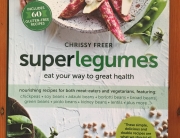 I go to the organic markets each Saturday and buy fresh 3 day old broccoli sprouts. I love adding them to my salads and their taste is absolutely delicious. I am always hearing about the latest “super food” that cures everything from insomnia to cancer. The vast amount of research that I have read on broccoli sprouts is very compelling – I am convinced that the high levels of sulphoraphane are incredibly beneficial. So, go ahead and start adding this incredibly therapeutic food to your diet. This is the epitome of “food as medicine!”
I go to the organic markets each Saturday and buy fresh 3 day old broccoli sprouts. I love adding them to my salads and their taste is absolutely delicious. I am always hearing about the latest “super food” that cures everything from insomnia to cancer. The vast amount of research that I have read on broccoli sprouts is very compelling – I am convinced that the high levels of sulphoraphane are incredibly beneficial. So, go ahead and start adding this incredibly therapeutic food to your diet. This is the epitome of “food as medicine!”
A new study suggests an easy way to reduce the risk of a bacteria associated with stomach cancer: eat broccoli sprouts. In a study conducted among 48 men and women from Japan, Johns Hopkins investigators found those who ate 70 grams of fresh broccoli sprouts a day significantly reduced the H. pylori in their stomachs.
All of the participants tested positive for the bacteria. The researchers then randomized them to either 70 grams of broccoli sprouts per day or a similar amount of alfalfa sprouts. The subjects were retested for H. pylori at four and eight weeks. By the final follow up, the broccoli sprouts had done the trick. People who ate the alfalfa sprouts showed no change in the degree of infection.
This study supports the emerging evidence that broccoli sprouts may be able to prevent cancer in humans, not just in lab animals, study author Jed Fahey, Sc.D., was quoted as saying.
Broccoli sprouts are rich in Sulforaphane, a naturally occurring phytochemical that enhances the cancer-protective capacity of animal cells. According to studies by Dr. Paul Talalay and his colleagues at Johns Hopkins University School of Medicine, sulforaphane induces Phase 2 detoxification enzymes. These are the enzymes which deactivate carcinogens and free radicals, thus enhancing the body’s own defence system against cancer-causing chemicals.
In animal studies, administration of sulforaphane blocked tumour development, reducing incidence, multiplicity, and size of carcinogen-induced mammary tumours. In general, Brassica family plants such as broccoli are rich in sulforaphane in its glucosinolate precursor form. However, the evidence suggests that broccoli must be eaten in large quantities to substantially reduce the risk of cancer. In addition, supermarket broccoli varies considerably in sulforaphane content, whereas certain varieties of young broccoli sprouts, grown under standardized conditions, contain large and highly uniform quantities of the compound.
Talalay and his colleagues identified the specific varieties of three-day-old broccoli sprouts containing 20 times the concentration of sulforaphane glucosinolate found in mature broccoli.
So go on, get some broccoli sprouts into your diet and your liver will love you for it,












































































































































